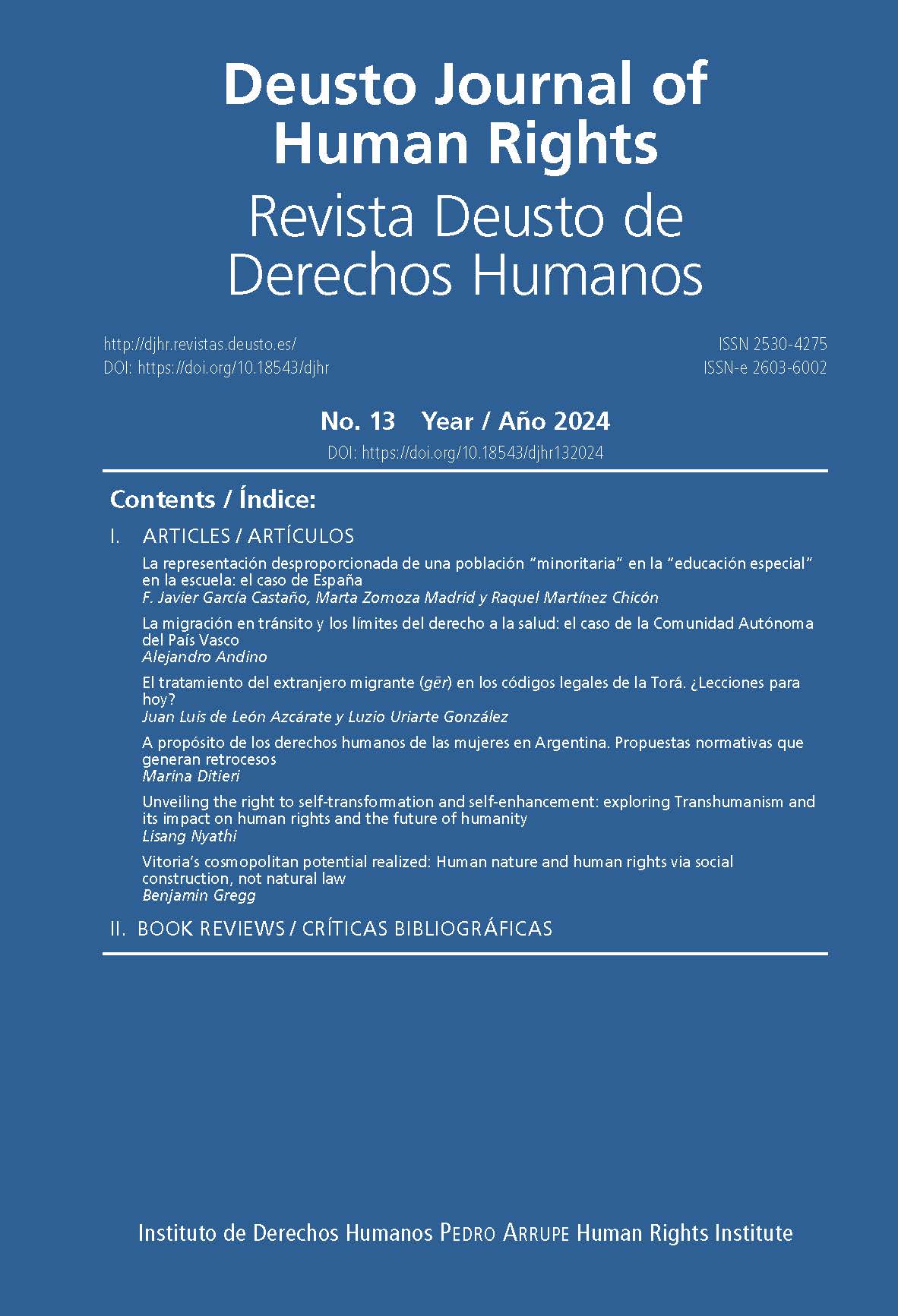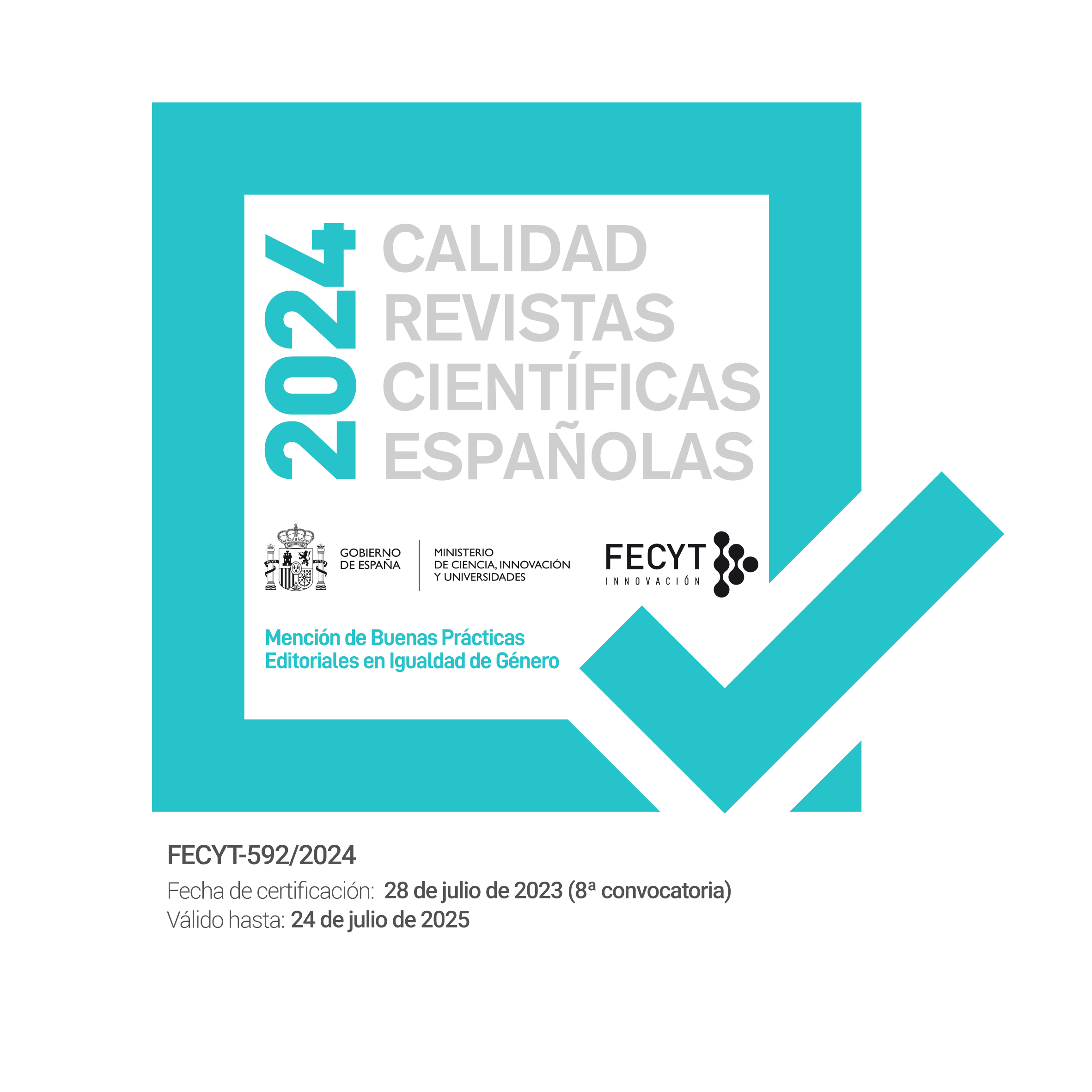El potencial cosmopolita de Vitoria hecho realidad: La naturaleza humana y los derechos humanos a través de la construcción social, no del derecho natural
Resumen
La conferencia de Vitoria de 1537 Sobre los indios americanos afirma la igualdad moral y los derechos fundamentales de todos los seres humanos, pero se contradice con las importantes desigualdades entre los conquistadores españoles y los pueblos indígenas de México y Perú. A pesar de reconocer estos derechos, la visión de Vitoria apoya una relación euroamericana desigual en lo que respecta a la soberanía territorial, la autodefensa, la autodeterminación y la libertad religiosa. Sus ideas tienen implicaciones para el derecho internacional contemporáneo relativo a los derechos indígenas. Sin embargo, su marco teológico limita este potencial. Para abordar mejor las cuestiones indígenas en la actualidad, abogo por replantear la perspectiva de Vitoria sustituyendo su esencialismo de los derechos humanos basado en el derecho natural por un enfoque naturalista que considere los derechos humanos como construcciones sociales. Este cambio puede ayudar a desarrollar el derecho internacional para prevenir interacciones violentas y promover la igualdad entre pueblos indígenas y no indígenas, reduciendo la dependencia de los Estados nación para salvaguardar los derechos indígenas.
Recibido: 03 agosto 2023
Aceptado: 18 abril 2024
Descargas
Citas
Altwicker, Tilmann. 2020. «Justice Beyond Borders – Extraterritorial Obligations from Thucydides to Grotius.» Rechtsphilosophie: Zeitschrift für Grundlagen des Rechts 6 (3): 234-248.
American Anthropological Association. 1947. Statement on human rights, committee for human rights. Accessed December 14, 2022. https://humanrights.americananthro.org/1947-statement-on-human-rights/.
American Anthropological Association. 1999. Declaration on anthropology and human rights, committee for human rights. Accessed December 14, 2022. http://www.aaanet.org/stmts/humanrts.htm.
Anaya, James. 1996. «‘Indigenous Peoples’ in International Law: A constructivist approach to the Asian controversy.» American Journal of International Law 92: 414-457.
Ayala, Francisco. 2012. The big questions: evolution. London: Greenfinch.
Bain, William. 2013. «Saving the innocent, then and now: Vitoria, dominion and world order.» History of Political Thought 34 (4): 588-613.
Barelli, Mauro. 2011. «Shaping Indigenous Self-Determination: Promising or Unsatisfactory Solutions?» International Community Law Review 13: 413- 436.
Barroso, Leonor D. and André A. Alves. 2019. «Vitoria and Erasmus on the Justice of War», in Empire, humanism and rights, edited by José María Beneyto, 171-187. Cham: Springer Nature.
Bunge, Kirstin. 2017. «Francisco de Vitoria: A redesign of global order on the threshold of the middle ages to modern times», in System, Order, and International Law: The early history of international legal thought from Machiavelli to Hegel, edited by Stefan Kadelbach, Thomas Kleinlein, and David Roth-Isigkeit, 38-55. Oxford: Oxford University Press.
Chetail, Vincent. 2016. «Sovereignty and migration in the doctrine of the Law of Nations: an intellectual history of hospitality from Vitoria to Vattel.» European Journal of International Law 27 (4): 901–922.
Cochrane, Alasdair. 2012. «Evaluating ‘bioethical approaches’ to human rights», Ethical Theory and Moral Practice 15 (3): 309-322.
Diderichsen, Adam. 2020. «The right to travel: Cosmopolitanism as imperial ideology», in Mogens Jacobsen, Emnet Gebre, Drago Župarić-Iljić, eds. Cosmopolitanism, migration and universal human rights. Cham: Springer.
Dierksmeier, Claus. 2019. «Globalization ethics in the sixteenth century? Why we should re-read Francisco de Vitoria», in Bartolomé de las Casas: History, philosophy, and theology in the age of European expansion, edited by David Orique and Rady Roldán-Figueroa, 197-217. Leiden: Brill.
Downes, Stephan and Edouard Machery, eds. 2013. Arguing about human nature: Contemporary debates. New York: Routledge.
Fuentes, Augustin. 2008. Evolution of human behavior. Oxford: Oxford University Press.
Gewirth, Alan. 1982. Human rights: Essays on justification and applications. Chicago: University of Chicago Press.
Gregg, Benjamin. 2003. Thick Moralities, Thin Politics: Social Integration across Communities of Belief. Duke University Press. Durham.
Gregg, Benjamin. 2012. Human Rights as Social Construction. New York: Cambridge University Press.
Gregg, Benjamin. 2014. Teaching Human Rights in the College Classroom as a Cognitive Style. In J. Shefner, H. Dahms, R. Jones, and A. Jalata, eds. Social Justice and the University. Basingstoke, UK: Palgrave:253-279.
Gregg, Benjamin. 2015. Advancing Human Rights in Post-Authoritarian Communities through Education. Journal of Human Rights Practice 7 (2):199-222.
Gregg, Benjamin. 2016. The Human Rights State: Justice Within and Beyond Sovereign Nations. University of Pennsylvania Press. Philadelphia.
Gregg, Benjamin. 2019. Indigeneity as Social Construct and Political Tool. Human Rights Quarterly 41 (4):823–848.
Gregg, Benjamin. 2021. Against Essentialism in Conceptions of Human Rights and Human Nature. Human Rights Quarterly 43:313–328.
Gregg, Benjamin. 2022. Creating Human Nature: The Political Challenges of Genetic Engineering. New York: Cambridge University Press.
Griffin, James. 2008. On human rights. Oxford: Oxford University Press.
Griffiths, Paul, Edouard Machery and Stefan Linquist. 2009. «The vernacular concept of innateness.» Mind and Language 24: 605-630.
Habermas, Jürgen. 1993. Moral consciousness and communicative action. Cambridge: Polity.
Harris, John. 2011. «Taking the ‘human’ out of human rights.» Cambridge Quarterly of Healthcare Ethics 20 (1): 9-20.
Hathaway, Oona. 2002. «Do human rights treaties make a difference?» Yale Law Journal 111: 1935-2042.
Idris, Murad. 2023. «Political theologies of Christian missionaries, European colonialism, and postcolonial resistance.» Journal of International Political Theory 19 (1): 139-146.
Jablonka, Eva and Marion Lamb. 2005. Evolution in four dimensions: genetic, epigenetic, behavioral, and symbolic variation in the history of life. Cambridge: MIT Press.
Kopel, David, Paul Gallant and Joanne Eisen. 2007. «The human right of self- defense.» Brigham Young University Journal of Public Law 22 (1): 43-178.
Macklem, Patrick. 2015. The sovereignty of human rights. New York: Oxford University Press.
Muldoon, James. 2006. «Francisco de Vitoria and Humanitarian Intervention.» Journal of Military Ethics 5 (2): 128-143.
Nussbaum, Martha. 1998. «Capabilities and Human Rights.» Fordham Law Review 66: 273-300.
Osborne, Thomas. 2023. «Francisco de Vitoria on the nature and source of civil authority.” Review of Politics 85: 1-22.
Ostler, Jeffrey. 2015. «Genocide and American indian history.» Oxford Research Encyclopedia of American History. https://doi.org/10.1093/acrefore/9780199329175.013.3.
Parekh, Sarena. 2007. «Resisting ‘Dull and Torpid’ assent: returning to the debate over the foundations of human rights.» Human Rights Quarterly 29: 754-778.
Pinker, Steven. 2002. The Blank Slate: The modern denial of human nature. London: Penguin.
Richerson, Peter and Robert Boyd. 2008. Not by genes alone: How culture transformed human evolution. Chicago: University of Chicago Press.
Rodríguez-Santiago, Elizabeth. 2016. “The evolution of self-determination of peoples in international law», in The theory of self-determination, edited by Fernando Tesón, 201-240. Cambridge: Cambridge University Press.
Tasioulas, John. 2010. «Taking rights out of human rights.» Ethics 120: 647- 678.
Tomasello, Thomas. 2019. Becoming human: A theory of ontogeny. Cambridge: Harvard University Press.
Turner, Bryan. 1993. «Outline of a theory of human rights.» Sociology 27: 489-512.
Vitoria, Francisco de. 1991a. «On the American Indians», in Vitoria: Political writings, edited by Anthony Pagden and Jeremy Lawrance, 231-292. Cambridge: Cambridge University Press.
Vitoria, Francisco de. 1991b. «Letter to Miguel de Orcos, 8 November 1534», in Vitoria: political writings, edited by Anthony Pagden and Jeremy Lawrance, 331-333. Cambridge: Cambridge University Press.
Deusto Journal of Human Rights / Revista Deusto de Derechos Humanos es una revista de Acceso Abierto; lo que significa que es de libre acceso en su integridad inmediatamente después de la publicación de cada número. Se permite su lectura, la búsqueda, descarga, distribución y reutilización en cualquier tipo de soporte sólo para fines no comerciales y según lo previsto por la ley; sin la previa autorización de la Editorial (Universidad de Deusto) o la persona autora, siempre que la obra original sea debidamente citada (número, año, páginas y DOI si procede) y cualquier cambio en el original esté claramente indicado. Cualquier otro uso de su contenido en cualquier medio o formato, ahora conocido o desarrollado en el futuro, requiere el permiso previo por escrito de la persona titular de los derechos de autoría.



3.jpg)
3.jpg)
3.jpg)
.jpg)








